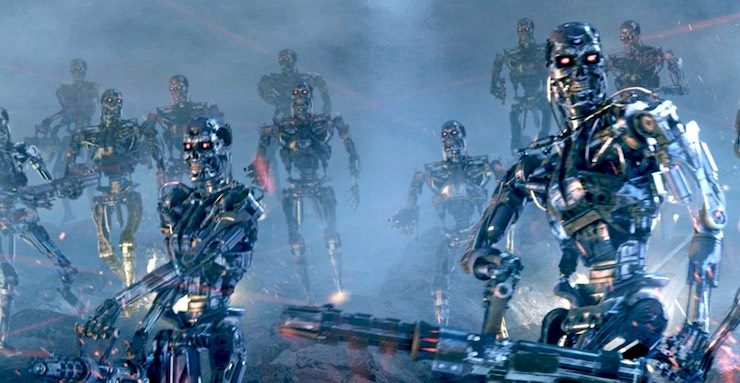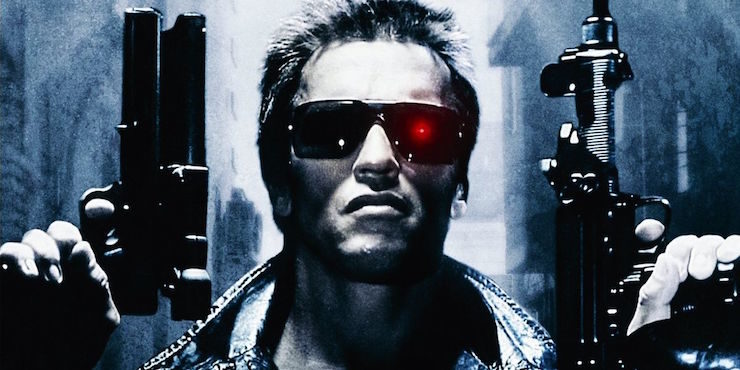There’s no real way to open a discussion of this week’s Terminator news other than: well, he DID say he’d be back. Mired in the pre-production for his incredibly ambitious, possibly wanted, filmed two-at-once Avatar sequel quadrilogy, James Cameron is reportedly looking to return to the Terminator franchise. Deadline reports that the rights revert back to Cameron in two years, and when they do, he will oversee both a reboot and conclusion to the series with Tim Miller of Deadpool in early talks to direct.
There’s a lot to digest here so let’s take this one step at a time.
First off, let’s talk about what he isn’t doing: writing and directing whatever we end up getting. Cameron, more and more, is learning how to get out of his own projects’ way. Avatar was a fascinating, ambitious script that got revised into toothlessness and Cameron’s recent choices seem to be a direct response to that experience. He’s overseeing the four Avatar sequels but writing none of them. Rick Jaffa, Amanda Silver, Josh Friedman, Shane Salerno, and Steven Gould are variously writing the sequels and the tie-in novels in a manner which clearly echoes the “writers’ room” approach of most American TV shows. This is a model we’ve seen more and more in movies over the last few years, with Hasbro (surprisingly) leading the charge with their various properties. It’s a smart move, ensuring narrative coherence and setting up overarching plots in ways that are subtle and deliberately designed rather than arbitrary.
That approach makes particular sense for a property like The Terminator, where Cameron is not only arguably too close to the original story but where there’s a wealth of additional material to wade through. Four sequels, two seasons of a consistently impressive and often great TV show, and numerous tie-in comics have attempted to both extend and end the story. Cameron’s position now is very different to the one he occupied 35 years ago. Back then he was brand new, stretched to the breaking point while somehow prepping The Terminator and filming Aliens on the other side of the Atlantic almost simultaneously. Now, he’s the patriarch of a three-and-a-half-decade-long comet tail in which content, fandom, expectation, and entitlement are liberally intermingled.
From that perspective, Cameron’s decision to “godfather” the movie is a perfect choice. He lends his name and status to it in a way no previous non-Cameron Terminator offering has quite enjoyed, and he gets to collaborate with and showcase a new, upcoming filmmaker whose first movie was a straight-up home run and comes to the project with plenty of kudos of his own. Even better, Cameron gets to be seen as the savior of the franchise, an impression that will stick even if the movie tanks. If it succeeds? He’s a hero. If it fails? He tried.

One of the elements of this story that interests me most though is the one that’s hidden in plain sight. The Deadline report mentions that David Ellison (no relation to Harlan), whose Skydance financed the ambitious but unsuccessful Terminator: Genisys, is bankrolling Cameron’s exploratory work on the sequel—specifically, it talks about “engaging some top-flight science fiction authors to find the movie creatively.”
For a franchise that was infamously accused of plagiarism by Harlan Ellison (a claim that was settled out of court) to be relying on established SF authors for new ideas is either highly ironic or it makes all the sense in the world—or maybe a little of both.
It’s also all but impossible to stop imagining who could be on that list. What would an N.K. Jemisin-designed Terminator movie play like? Or a Kameron Hurley version? Gemma Todd’s debut, Defender, is a textbook example of how to do post-apocalyptic fiction brilliantly well and I’d love to see her given a chance to contribute to the movie. Then there’s Audrey Niffnegger, who has experience with this sort of story, or Myke Cole, or Adrian Tchaikovsky. The list of brilliant talents who could bring something genuinely new to this franchise is as least as long as your TBR list and it’ll be fascinating to see who ends up as part of that second, stealthy, writers’ room.
And then there’s the elephant in the room, that word “conclusion.”
Endings are anathema to big budget franchises in particular for the obvious reason that they mean the money stops rolling in. The rule of Hollywood has long been that as long as an IP is alive and earning, it will never be allowed to truly end. And for much of the Terminator franchise, that’s been the problem. Rise of the Machines has a fantastic ending—and a parade of dismal, sexist action sequences to slog through before you get there. Salvation, purportedly a rolling dust cloud of catastrophe during filming, is a series of brilliant images and ideas in search of a coherence it never finds. Finally, Genisys is a fantastic idea hobbled by this exact problem: the film sets up a continuation at the expense of being a satisfying viewing experience in its own right. Only The Sarah Conner Chronicles stands as a uniform success and “Goodbye To All That” in Season 2 is one of the few genuinely definitive Terminator stories. But even then, its strength comes from the fact that it was given a chance to end. It doesn’t conclusively tie much up but there’s a sense of closure that every movie beyond Judgment Day has utterly lacked.

A conclusion gives Cameron, Miller (once he signs), that mysterious writers’ room, and the studio a chance to not only remedy all this but do something almost unprecedented in Hollywood: admit fault. By ending the story they not only give back some of the dignity the franchise has lost but at least tacitly admit that the previous sequels never quite worked. We don’t know yet how much beyond Judgment Day will stay in terms of continuity, but I’d honestly expect it to be nothing. Much like Neill Blomkamp’s perennially-delayed (and now maddeningly unlikely) Alien sequel, this is a chance to cut out and cauterize the material that’s widely viewed as not working and reset the story (probably launching a thousand “This is the correct viewing order” articles in the process).
Most of all though, a conclusion serves as both a major event and a rescue mission. Release a new Terminator movie now and most people’s response will be “WHY?!” Release a new Terminator movie in two years with “LAST CHANCE TO SEE” on the posters and the curiosity value alone will bring people in. Once you have them, then the tricky part is to provide a satisfying end to the franchise and give your audience what they want while running the risk that they’ll want more. Leaving the stage is almost impossible when you’re a success and yet, oddly, that’s the best time to do it. Better still, if they make it work then this will be the first modern movie franchise of its scale to end because it can and not because it has to. That’s a game changer and for Cameron—the man who never met a ludicrous order of operations puzzle he didn’t obsess over—that’s got to be as much of an attraction as getting his baby back.
The Terminator first stalked the streets of L.A. in the shadow of the closing act of the Cold War. The world has come a long way since then and, perhaps, started to double back. I can’t say I’m unabashedly enthusiastic about another go-round, if for no other reason than because Schwarzenegger has been progressively less interesting in every appearance in the role, but I can say this news has my attention. If anyone can bring this story in for a smooth landing, years after it should have been, it’s Cameron and his team. After all, there’s no fate but what we make for ourselves (or at least, turn up to the box office to see…)
Alasdair Stuart is a freelancer writer, RPG writer and podcaster. He owns Escape Artists, who publish the short fiction podcasts Escape Pod, Pseudopod, Podcastle, Cast of Wonders, and the magazine Mothership Zeta. He blogs enthusiastically about pop culture, cooking and exercise at Alasdairstuart.com, and tweets @AlasdairStuart.










